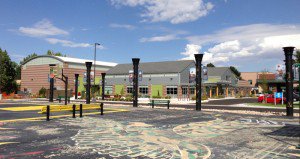Share This
Related Posts
Tags
Out of the Box
By Leah Etling on May 12, 2014 in People
The development projects and community initiatives of Denver’s Urban Land Conservancy (ULC) don’t fit in just one box. In fact, they don’t even fit in several boxes.
just one box. In fact, they don’t even fit in several boxes.
Founded with the intent to improve and support parts of the city needing the most TLC, the ULC is not just a nonprofit developer, or a project proposer, or a community advocate, or a saving grace financier. It’s a medley of all that and more, a unique real estate hybrid that aims to improve, elevate and assist in areas where help is needed most.
Founded in 2003 with seed funding from Sam Gary and Gary Williams Energy Corp, ULC, a Yardi client, is now a standalone nonprofitwith a mission to preserve real estate in urban areas, for the benefit of the community at large. The group ramped up its efforts from 2007 onward, when current President and CEO Aaron Miripol was hired. The energetic Miripol, who rides his bike to most meetings and has over 20 years of experience in affordable community development, has been a driving force behind the success.
“He’s the most passionate person I have ever worked with,” said Christi Craine, Operations and Communications Director for ULC. “He has driven the growth of ULC’s portfolio from two pieces of real estate to investments in 19 properties, and we’ve become a resource for those hoping to practice place-based real estate based on community need.”
ULC has been on a roll as of late, with multiple projects that include 800 units of transit-proximate affordable housing, a neighborhood-transforming youth center, and multiple nonprofit support ventures. In one instance, ULC swooped in to buy the property of a school serving neglected children that was close to having to shut down due to financial woes – over four years, the school raised the funds to buy their building back, at the exact same purchase price.
“The uniqueness of a nonprofit real estate company that can partner with other nonprofits, for-profits, schools, foundations, municipalities and federal institutions to successfully develop and preserve real estate to benefit communities is rare,” ULC President and CEO Aaron Miripol stated. “We have brought economic development opportunities, jobs and housing options to communities that otherwise may not have seen this kind of catalytic investment. Taking a leadership role in acquiring these catalytic sites and being willing to take the risk necessary for maximum impact is part of our mission, and it is our job to take the risk that other organizations may not have the capacity to do.
One of the nonprofit’s most visible projects has been the redevelopment of Holly Square, a former shopping center in Northeast Park Hill that was destroyed by arson in 2008. Gang-related activity had plagued the site and the neighborhood around it, and ULC heard from the community that they wanted to refocus the energy on the 2.6 acre site toward youth-oriented, neighborhood-supportive, peace-promoting goals.
“This property is the heart and soul of what ULC’s mission is all about,” Craine said. One measure of success: Holly Square hasn’t been touched by graffiti since it opened, a sign of respect. Crime has also dropped in the area, and ULC is working with adjacent property owners in the hopes of continuing to improve the entire surrounding neighborhood.
A youth center was the ultimate consensus for development, and the Nancy P. Anschutz Community Center, home to a very active chapter of the Boys & Girls Club, opened in fall-2013.
Additional acreage on the site is slated for later development, and is temporarily being used as basketball and futsal courts. Community engagement in the improvements has been an important part of the redevelopment, and a recent “Community Build Day” involved the Colorado Construction Institute, a nonprofit that trains disadvantaged youth and young adults in the construction trade.
In the realm of transit-proximate housing, ULC has also been a leader. Denver is currently in the process of building out its mass-transit offerings – the vastly improved system will be unveiled this spring – and the opportunity to locate housing near light rail stations was a key priority over the last five years.
“Land values are skyrocketing as we speak,” Craine said. “We worked in partnership with the City of Denver and Enterprise Community Partners in 2009 to create the first ever transit-oriented development (TOD) fund, a $15 million fund that was created so ULC had access to loan funds to acquire existing affordable housing or land on which to develop affordable housing.”
The result was a development pipeline of 625 affordable homes spread over eight properties – some of them units that could have been lost if ULC hadn’t purchased the buildings and retained their affordable status. Denver is in drastic need of affordable housing, and Mayor Michael Hancock has pushed to revamp city mandates on developers to provide below market-rate homes. One of the focuses of that plan is affordable units near the new transit services – perfect for a carless population that can use bus and rail services to reach their jobs.
ULC used up the $15 million it has designated for TOD housing two years ahead of schedule, and is now supporting the creation of a $30 million regional fund for affordable housing preservation and development across the region. With transit-focused development now a priority of cities nationwide, their work is already attracting attention and emulation around the country.





